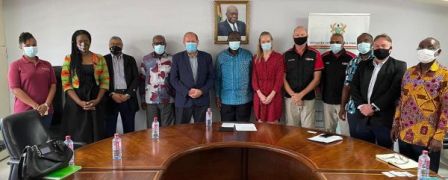EFULA ABBA
Following six years of President Muhammadu Buhari Administration’s shilly-shally with auto industry development, the government of Ghana has concluded plans to position itself as the automotive industrial hub in West Africa.
Towards this end, the country recently launched a component manufacturing industry, aimed at providing a strategic guideline for the development of the steel, aluminum, and rubber industry in the country.
It would be recalled that in 2019, Ghana passed into law a duplicated version of Nigeria’s Automotive Industry Development Plan (NAIDP), a move that has attracted into the country assembly plants of major auto brands, including Toyota and Volkswagen.
Sources close to the African Association of Automotive Manufacturers (AAAM) revealed that OEMs are confident in setting up auto plants in Ghana, because they know the industry has a solid plan backed by law, hence, unlike Nigeria’s case; there will be no policy summersault.
No wonder, towards the end of March, the African Association of Automotive Manufacturers (AAAM) hosted an exploratory visit by automotive component manufacturers to Ghana.
According to AAAM, the move was aimed at introducing potential investors to the Ghanaian automotive market.
Akin to the Nigerian abandoned NAIDP, Ghana’s activated policy is especially focusing on aftermarket opportunities, which, in time, should also support vehicle assembly as this volume grows.
As started in Nigeria in 2014, Ghana’s auto industry development has kick-started with Semi-knocked Down assembly plants, which means almost all components are, at the moment, imported.
During the one-week event, AAAM facilitated back-to-back engagements between Ghana vehicle assemblers and Executives from Maxe (a division of KAP Automotive), Supreme Springs (a division of Metair) and Hudson Rubber were, local manufacturers, vehicle dealers and spare parts importers, as well as the Ghana Standards Authority and the African Continental Free Trade Area (AfCFTA) Secretariat.
During the meeting, AAAM made it clear that a vital aspect of the newly drafted Ghana Automotive Development Policy is to develop auto component manufacturing with local partners.
“This is the first of many visits planned by the AAAM office in Accra in support of developing the automotive industry in Ghana,” AAAM, CEO David Coffey, pointed out, adding, “It was most encouraging to witness the positive interaction between potential investors, local companies and the willing support offered by the Ghanaian authorities.”
On the last day of the developmental engagement, Ghana’s Minister of Trade and Industry Alan Kyerematen reportedly stressed the significance of the development to the nation’s industrial aspiration, expressing the country’s willingness to engage in competitive fiscal incentives for those components manufacturers wanting to invest in Ghana.

“The potential take-off of a component manufacturing industry,” Kyerematen enthused, “would provide strategic guidelines for the development of steel, aluminum, and rubber industries in the country.”
From 2013, the former administration of Goodluck Ebele Jonathan drafted the NAIDP. But the president failed to sign it into law after being passed by the National assembly.
After the 2015 General Election, the bill went through a similar process and got passed by the Senate and House of Representatives, only to suffer a setback, as President Buhari again declined to sign the bill into law.
Although the reason given was that the bill contained some errors, which needed to be corrected, Motoring World gathered that, following political lobbying from certain career dealers of imported Fully Built-up(FBU) vehicles, the president as well as the new Minister of Industry, Trade and investment, Otunba Niyi Adebayo agreed to suspend the NAIDP.
One of the criticisms against the NAIDP was that Nigerians have never benefitted from the plan since its implementation commenced, as the cars locally assembled remain unaffordable, despite all the incentives enjoyed by the licensed auto assemblers.
However, on the contrary, locally assembled vehicles have remained expensive, because the NAIDP has never been fully implemented, as it has all along been waiting for passage into law. For instance, although duties on imported vehicles were increased to over 70% to discourage imported vehicles from competing with locally assembled vehicles, other vital contents of the NAIDP which were never implemented include licensing of auto Finance Banks, as it is done in South Africa.
Rather than signing the NAIDP, President Buhari instead worsens the case of local auto manufacturing by, on December 31st, 2020, signing into law a controversial Finance Bill, which dropped import duties on imported fully built up vehicles to as low as 5%, a development that auto industry analysts believe, could lead to shutting down of local assembly plants, as it would become more profitable to import vehicles for sale rather than assembling locally.
©Copyright MOTORING WORLD INTERNATIONAL.
All rights reserved. Materials, photographs, illustrations and other digital content on this website, may not be reproduced, published, broadcast, rewritten or redistributed in whole or in part without prior written permission from Motoring World International
Contact: editor@motoringworldng.com




